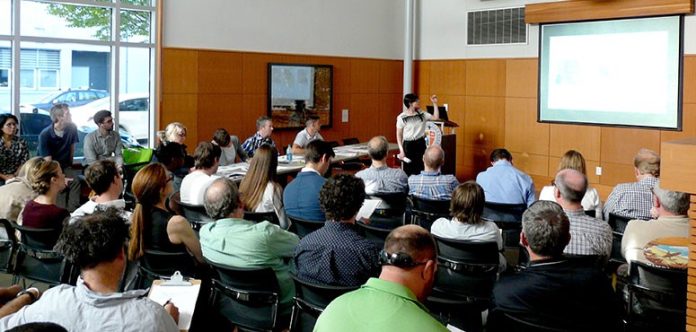
The Office of the Mayor announcing legislation extending Covid-era exemptions that allow affordable rental housing projects to skip design review, the costly and time-consuming architecture critiques widely seen as a roadblock to development in Seattle. The year-long extension would allow for development of further legislation that may permanently codify the exemption. Councilmembers Dan Strauss and Teresa Mosqueda are credited with partnering on developing the legislation.
“Seattle’s housing affordability and homelessness crisis demands bold action and creative solutions to more urgently create affordable housing,” Mayor Bruce Harrell said in a statement. “This legislation will reduce permitting bottlenecks so that the process is more swift, efficient, and consistent.”
In response to the Covid-19 pandemic, the city council passed ordinances providing temporary exemption from design review for certain affordable housing projects. Instead qualifying affordable housing projects have been shunted through an expedited version of “administrative design review” conducted in-house by planners at the Seattle Department of Construction and Inspections (SDCI). Applicants have reported administrative design review can be a headache in its own right, but most still prefer it to full design review, with its unpredictable boards of volunteers — mostly architect insiders.
According to findings listed in the new legislation, 19 publicly-funded developments totaling approximately 2,400 low-income housing units skipped design review under these exemptions. (This number does not fully coordinate with the number of housing projects and units listed in the mayor’s homelessness dashboard.) The Covid emergency lapsed on October 31 and the subsequent exemptions conclude 60 days later, at the end of the year.
“As has been proven during the course of the pandemic, we can unburden projects that create more homes from lengthy and expensive design review processes and produce high-quality housing that compliments and serves the community,” Mosqueda said in a statement. “This legislation will allow us to build on the success of the Covid-19 design review exemption for affordable housing — and continue working to put permanent policies in place that support creating the diverse housing we need across the city.”
The new one-year hiatus permits the council time to develop further legislation, including required full State Environmental Policy Act (SEPA) reviews. Besides permanently exempting affordable housing from design review, the mayor lists a pair of two-year trials to potentially be included in further legislation. The first would exempt projects that create units for the Mandatory Housing Affordability (MHA) program on-site. The second would broaden the types of housing projects allowed to skip design review and opt into administrative design review instead. Further details on those pilot programs were not forthcoming.
So far, most developers have selected the in-lieu payment option over the on-site performance option to fulfill their MHA obligations. The design review exemption for on-site performance could push them in the other direction, since the delays and hurdles of design review can be quite costly. The City has leveraged the MHA payments to increase affordable housing production, but critics, such as Councilmember Alex Pedersen, argue more housing should go on-site at new developments to ensure affordable housing is being added in fast-growing neighborhoods.
The council’s Land Use Committee will discuss this legislation on November 30 and hold a public hearing on December 8. Council could vote on the legislation on December 13.
Small progress on longstanding issue
For years design review has been the focus of housing activists, who see it as a fraught and arbitrary process holds up needed housing in the city. An ECONorthwest analysis found permit times exceeded 18 months on average for projects undergoing full design review from 2010 to 2020. Developers report Seattle’s permit times can be three times longer than on similar projects in Tacoma’s more streamlined process.
Last year, a group made up of representatives from the Seattle For Everyone coalition, Share The Cities Action Fund, AIA Seattle, non-profit and private housing developers, as well as land use attorneys, residents, and environmentalists published recommendations to improve the design review program. The problems they found focused on the time-consuming unpredictability in the process, its potential to be misused for predatory delay, and the lack of diversity in the members of the various boards.
Indeed, as part of the announcement of legislation, the Mayor’s Office did mention that there are 21 open seats on various design review boards, and that applications are being accepted to fill those positions through December 31, 2022. Applications may be submitted here.
The need for change in design review has been recognized by the City Council. The extension bill finds “the lengthy and complex land use review processes, such as design review, add time and cost to affordable housing development. Design review can add months to the time required to permit affordable housing projects, increasing costs and delaying the time when affordable units can enter service.” In last year’s budget, the council established a work program for the Seattle Department of Construction and Inspections (SDCI) to convene a stakeholder group to review the design review program and recommend changes. Those changes were to consider the program’s effect on housing costs. Official findings from this stakeholder process are not expected before next year.
The Urbanist has been reporting on efforts to improve Seattle’s design review process since 2015, including notable horror shows. Other local publications have also noted the need for design review to improve or go away entirely, with one glaring exception.
But the wonky nature of permitting and reviewing a building’s design, and its faux populist gatekeeping of neighborhood “character,” make even the most minute changes to design review seem monumental. Extending a temporary exemption for a tiny class of buildings is minute indeed. In the pages of recommendations from Seattle For Everyone, there are 20 suggestions for both legislative and administrative improvements. All those administrative ones can be done with a stroke of the mayor’s pen. Only one of the recommendations — keeping the meetings remote and online — has been made permanent. Waiving full design review for affordable housing is a fraction of one other.
Seattle’s design review process was created locally, and remains controlled locally. It is not a creature of state or federal requirements so there’s no holdups coming from outside. It is a 100% Seattle process. While the legislation’s announcement claps a little too hard for this mayor’s efforts in affordable housing, he has spent his first year in office just getting around to looking at this roadblock. And the first act could be to carry on as we are for another year. That doesn’t deserve too much applause.
Ray Dubicki is a stay-at-home dad and parent-on-call for taking care of general school and neighborhood tasks around Ballard. This lets him see how urbanism works (or doesn’t) during the hours most people are locked in their office. He is an attorney and urbanist by training, with soup-to-nuts planning experience from code enforcement to university development to writing zoning ordinances. He enjoys using PowerPoint, but only because it’s no longer a weekly obligation.

